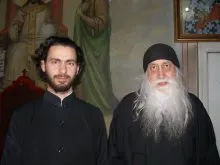

This expression seems to reflect the very situation in which the Gagauz people find themselves nowadays. As Fr. Cosmas puts it, “The Gagauz look very favorably on the time when they were part of the Soviet Union.” Now many are confused about their own identity, and they have to make special efforts to recognize it. “I would say they suffer from the ‘Rodney Dangerfield complex’. They don't feel any respect. Among Turks they are looked down on for not being Muslims, and among Orthodox Christians they think they are looked down on for being Turkish. So when somebody does appreciate them, he gets an extravagant response.”

It is only people themselves who can make an effort to “turn this mill”. Such are language enthusiasts like Fr. Cosmas or one of his new Gagauz friends, who has multiple talents as a painter, sculptor, singer and a recording engineer. This Gagauz man has his own studio and produces albums of young Gagauz singers solely and deliberately in their mother tongue. In order to encourage a promising singer in her early twenties to value the language of her ancestors, he set up a meeting between her and Fr. Cosmas. She was utterly surprised that this American (and an Orthodox Christian at that) spoke Gagauz but no Russian! Fr. Cosmas shares his impressions of their meeting, “She sings in Gagauz, because she memorizes her songs, and so she sounds like a native speaker, but she doesn’t speak the language either with her friends or with her parents. She did that when she was very young. But now she was in agony during our conversation. So embarrassed, because she couldn’t think of how to say anything. Once it was time to leave, she couldn’t even remember how to say ‘good-bye’ in Gagauz.”
During his trip to Gagauzia, Fr. Cosmas received an enormous amount of attention and was even awarded a medal by the governor for his service to Gagauzia. “When things like this happen, this is not about me. This is about them and about their feelings of themselves. I do not let it inflate my ego”, Fr. Cosmas humbly comments. “They were very eager to meet me, just because they felt that an honor was given to their country, language and culture.” A local woman shared that when she addressed Fr. Cosmas in Gagauz and heard him respond in her mother tongue, her whole being was filled with utmost delight. What a contrast this foreigner was with many Gagauz young people. They are eager to study foreign languages in order to get a better job, while he is eager to study their heart language just because he loves it.

In a local Gagauz newspaper there is an article about Fr. Cosmas, although it is written in Russian. The journalist concludes, “When we forget our mother tongue, we forget our history.But all of a sudden, somewhere on the other end of the world, there arise people who accept our language and our culture as though it were their own.”
Let us hope that the wind is blowing favorably for the Gagauz-speaking Christians at last. And let us pray that the mill has already begun to turn due to the efforts of mother tongue enthusiasts, like those mentioned in this story who are devoting their lives to translating the Bible into their heart language and also all those that are ready to support them.
IBT Russia/CIS is a non-profit organization financed through contributions from individuals, sponsoring organizations and foundations.
You can donate to IBT:
Through: AO UniCredit Bank, Moscow
SWIFT: IMBKRUMM
In favour of: Institute for Bible Translation
Address: 119334, Russia, Moscow, Andreevskaya nab. 2
TIN (INN) 7736231521
9-digit Bank identification code in Russian banking system: 044525545
Account no. (IBAN):
634261 USD 4020 02 001 or 40703840700010142881
634261 EUR 4020 02 001 or 40703978700010366720
634261 GBP 4020 02 001 or 40703826600010366723
Through: NOSTRO ACCOUNTS OF AO UNICREDIT BANK, MOSCOW:
USD JPMORGAN CHASE BANK N.A., NEW YORK SWIFT CODE: CHASUS33
EUR UNICREDIT BANK AG (HYPOVEREINSBANK) , MUNICH SWIFT CODE: HYVEDEMM
EUR UNICREDIT BANK AUSTRIA AG, VIENNA SWIFT CODE: BKAUATWW
EUR UNICREDIT S.P.A., MILANO SWIFT CODE: UNCRITMM
GBP THE ROYAL BANK OF SCOTLAND PLC, LONDON SWIFT CODE: RBOSGB2L
Important! In the field "designation" write "CHARITY DONATION"
For more information address IBT
You may sign up to receive our Russia/CIS monthly English newsletter here
